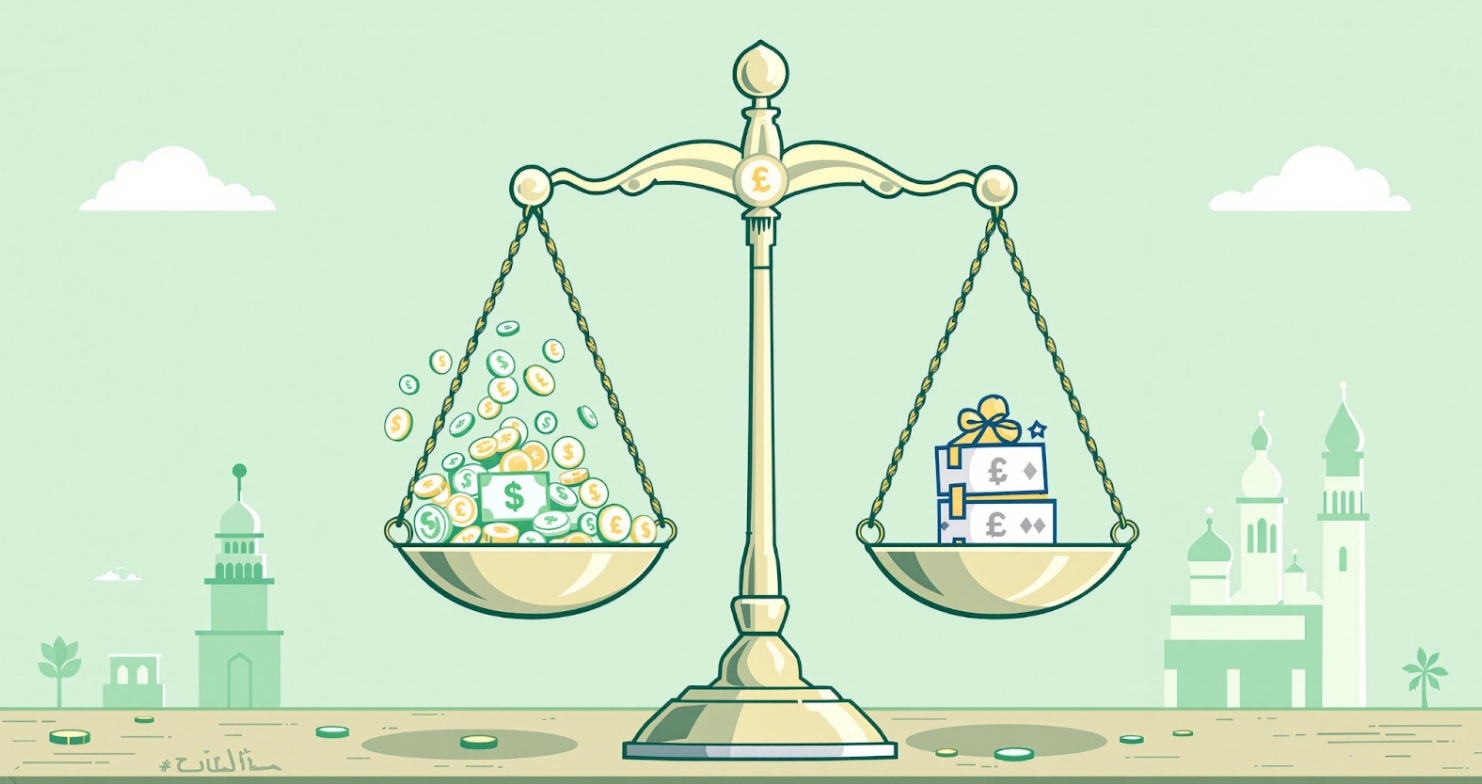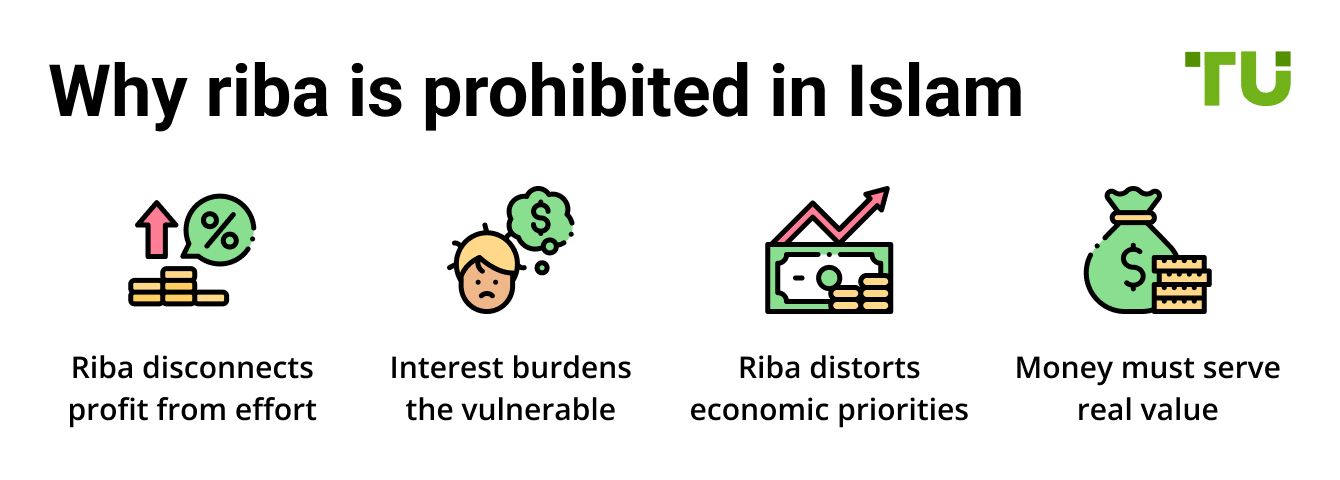Riba In Islam: Prohibition, Impact, And Permissible Alternatives



Editorial Note: While we adhere to strict Editorial Integrity, this post may contain references to products from our partners. Here's an explanation for How We Make Money. None of the data and information on this webpage constitutes investment advice according to our Disclaimer.
Riba, often translated as usury or interest, refers to any unjustified increase in wealth through loans or transactions that exploit individuals. It is strictly prohibited in Islam due to its exploitative nature and its role in creating economic disparities. To avoid engaging in riba, Muslims are encouraged to utilize Islamic banking systems that comply with Sharia law, ensuring financial dealings are free from interest.
Riba in Islamic finance refers to the prohibited practice of gaining unjust profit, especially through the charging of interest on loans. This concept includes any form of guaranteed capital increase that is not based on real economic activity, risk, or effort. Riba in Islam is condemned as both an economic and moral injustice that disrupts social balance and leads to the exploitation of vulnerable members of society.
The prohibition of riba is one of the fundamental principles of Islamic law. It is closely tied to Islam’s stance on the concept of interest: interest in Islam is not seen as a neutral or standard economic practice, but rather as a form of economic wrongdoing. According to Islamic beliefs, money should not generate money by itself — such practice violates the nature of fair exchange. Therefore, all forms of income derived from interest in Islam are considered incompatible with Sharia ethics.
Risk warning: All investments carry risk, including potential capital loss. Economic fluctuations and market changes affect returns, and 40-50% of investors underperform benchmarks. Diversification helps but does not eliminate risks. Invest wisely and consult professional financial advisors.
Understanding riba in Islam
The term riba is derived from Arabic and means "increase," "growth," or "excess." In economic terms, riba has a straightforward meaning in Islam: any unjustified gain in trade or business dealings, where one party benefits without taking on risk or contributing labor. The prohibition does not target profit itself, but rather profit that is unearned, one-sided, and unfair.

Islamic jurisprudence identifies two primary categories of riba:
Riba al-nasi’ah, which is a surplus charged in return for a deferment or delay in payment. This form closely resembles modern interest in Islam and is considered its most explicit manifestation.
Riba al-fadl, which involves an unequal exchange of commodities of the same type (e.g., gold for gold in unequal amounts). Even if such an exchange occurs immediately, it is classified as riba due to the lack of equivalence.
Riba in Islam (according to the Quran) is not treated as a technical legal issue, but rather as a violation of core Islamic principles: fairness, mutual benefit, and transparency in financial dealings. Transactions that involve gharar (excessive uncertainty) or maysir (speculation or gambling) are also prohibited, as they undermine trust and create imbalance between parties. Therefore, even when interest in Islam appears in modern or indirect forms, it is subject to strict scrutiny and often falls under the same prohibition.
What is riba and interest in Islam?

One of the most common questions among practicing Muslims is: what is riba in Islam and what is interest in Islam. While these terms are often associated with interest rates, the concept of riba in Islamic tradition is broader. It refers to any form of financial gain that is secured without taking on risk, engaging in trade, or providing a real service.
From the perspective of Sharia, any predetermined monetary gain derived from lending money is considered riba. This includes not only conventional bank interest but also various other forms of financial return, such as certificates of deposit (CDs), stock lending, late payment fees or disguised charges, which fall under the definition of interest in Islam and are therefore prohibited.
In contemporary practice, interest in Islam typically appears in loan agreements, mortgages, microfinance, and investment products with guaranteed returns. Islamic scholars emphasize that there is no distinction between fixed and floating interest rates: both types ensure profit without participation in a real economic activity, which classifies them as forms of riba.
The subject of interest in Islam as per Quran holds a central place in Islamic legal and ethical teachings. The prohibition of riba is not merely a scholarly interpretation—it is explicitly stated in the Qur’an, leaving no room for ambiguity. In Surah Al-Baqarah (2:275), it is said:
"Those who consume riba will not stand [on the Day of Judgment] except as one stands who is being beaten by Satan into insanity… Allah has permitted trade and forbidden riba."
Why interest is prohibited in Islam - Key reasons
The answer to why interest is prohibited in Islam is deeply rooted in the ethical, economic, and social foundations of Islamic finance. The prohibition is not merely a legal ruling, but a reflection of a broader vision for a just and balanced financial system — one in which resources circulate fairly and wealth is not hoarded by a privileged class of lenders.
Let’s understand Why riba is prohibited in Islam:

Riba disconnects profit from effort. Interest allows profit without risk or contribution to real economic activity, violating the principle of equitable exchange.
Interest burdens the vulnerable. Fixed or compounding interest traps borrowers in debt, especially the poor, leading to long-term economic injustice.
Riba distorts economic priorities. It diverts capital from productive sectors to speculative markets, fueling asset bubbles and financial instability.
Money must serve real value. In Islam, money is a medium of exchange — not a commodity to generate profit without risk, effort, or value creation.
Punishment for paying interest in Islam
Surah Al-Baqarah (2:279) contains one of the most severe warnings in the Qur’an regarding interest:
“If you do not give up [riba], then be informed of a war from Allah and His Messenger…”
The Qur’an rarely issues direct declarations of divine war, making Surah Al-Baqarah (2:279) a powerful indicator of how seriously Islam treats interest-based transactions. The punishment for paying interest in Islam extends beyond material harm — it encompasses moral and spiritual consequences.
According to authentic hadith, the Prophet Muhammad (peace be upon him) condemned all parties involved in riba, including those who pay it. This highlights the severity of interest in Islam hadith sources, where both giver and receiver of interest are equally accountable. In Islamic law, there is no moral distinction between the one who imposes interest and the one who accepts it. This principle aligns with the broader message found regarding interest in Islam Qur'an, where such transactions are repeatedly warned against. Understanding why interest is haram in Islam requires recognizing that it undermines justice and exploits financial vulnerability. This is ultimately why interest is forbidden in Islam — because it violates the core ethical and economic principles set by Sharia.
How to avoid interest in Islam?
The question of how to avoid interest in Islam is especially relevant for Muslims living in conventional financial environments. Completely avoiding contact with interest can be challenging, particularly when purchasing a home, opening a bank account, or running a business. However, there are proven strategies that can help minimize or fully eliminate involvement in riba:
Choose Shariah-compliant institutions. Work with Islamic banks and cooperatives that avoid interest through models like murabaha, ijarah, mudarabah, and musharakah.
Avoid interest-based products. Refrain from using credit cards with interest or signing contracts with hidden riba clauses, even if they’re not labeled as loans.
Plan finances the Islamic way. Use halal models like ijarah muntahia bi-tamlik for home financing and ensure investments are free from interest and tied to halal industries.
Build Islamic financial literacy. Learn key Islamic contracts, spot haram elements in modern products, and stay mindful of ethics—not just rules—in all financial decisions.
Your safest bet for avoiding Maysir when trading or investing is by using Shariah-compliant brokers. And luckily, you don’t need to do the hard work here. We have already researched the market and presented the top Shariah-compliant brokers offering Islamic accounts in the table below. You can compare them and make a choice for yourself:
| Swap Free | Crypto | Stocks | Currency pairs | Min. deposit, $ | Regulation | TU overall score | Open an account | |
|---|---|---|---|---|---|---|---|---|
| Yes | Yes | Yes | 60 | 100 | FCA, CySEC, MAS, ASIC, FMA, FSA (Seychelles) | 6.83 | Open an account Your capital is at risk. |
|
| Yes | Yes | Yes | 90 | No | ASIC, FCA, DFSA, BaFin, CMA, SCB, CySec | 7.17 | Open an account Your capital is at risk.
|
|
| Yes | Yes | Yes | 68 | No | FSC (BVI), ASIC, IIROC, FCA, CFTC, NFA | 6.79 | Open an account Your capital is at risk. |
|
| Yes | Yes | Yes | 80 | 100 | CIMA, FCA, FSA (Japan), NFA, IIROC, ASIC, CFTC | 6.95 | Study review | |
| Yes | No | Yes | 50 | 200 | No | 1.95 | Study review |
What to do with interest money in Islam?
Situations may arise in which a Muslim unintentionally receives money derived from riba. This may include bank interest, returns from old contracts, corporate bonuses linked to interest, or interest accrued on savings accounts. When such funds are acquired, the question becomes: what to do with interest money in Islam?
How to use interest money in Islam (Riba Funds):
Permitted uses. In response to where can we use interest money in Islam, scholars permit its use for public welfare—such as road repairs, sanitation, or similar infrastructure—or for emergency aid to the poor, particularly when no halal alternatives exist.
Donation rules. Can I donate interest money in Islam? Yes, but only under strict conditions. It must be donated without the intention of earning spiritual reward. Scholars classify this not as an act of charity (sadaqah or zakat), but as a means of purifying one’s wealth from unlawful earnings.
Principle of harm neutralization. Since interest is not halal, its use must not benefit the giver directly. It can be used to pay off another person’s debt — but only if the donor gains no personal or financial advantage.
The question of what interest money can be used for in Islam arises often, especially for those who unknowingly engage in taking interest in Islam through conventional banking. Scholars clarify that while riba is prohibited, there are limited ways to dispose of such money responsibly.
Is bank interest haram?
This question frequently arises among Muslims who interact with conventional financial systems, especially in countries where Islamic banking is not yet the norm. Although Islamic finance offers alternative structures, most individuals still deal with interest-bearing accounts, loans, and savings. The overwhelming consensus among Islamic scholars is that bank interest falls under the category of riba and is therefore haram.
Some contemporary voices argue from a modernist perspective, claiming that bank interest is not riba. They maintain that modern interest is different from pre-Islamic usury, and base their argument on the following points:
Banks today are regulated institutions, operating within formal economic frameworks;
Interest supposedly compensates for inflation, risk, and administrative costs;
Transactions are conducted with mutual consent and transparency, without overt exploitation.
The majority of classical and contemporary scholars affirm that bank interest is haram, as it qualifies as riba al-nasi’ah — a prohibited increase based on time delay.
Is compound interest haram?
Let us now address the question: is compound interest halal or haram? Unlike simple interest, which is calculated solely on the original principal, compound interest involves charging interest on both the principal and the accumulated interest over previous periods. This results in a rapidly growing financial obligation and is considered one of the most aggressive forms of debt escalation.
Islamic law does not distinguish between simple and compound interest. Compound interest is viewed as an intensified form of riba al-nasi’ah — a time-based increase in repayment without a corresponding exchange of goods or services, which makes it clearly prohibited.
Arguments based on contract consent, inflation, or market norms do not alter its status. Sharia evaluates substance over form — and any guaranteed profit without risk-sharing or real economic activity is haram.
Compound interest is commonly found in credit cards, mortgages, and loans, especially in conventional banking. Its compounding effect often worsens debt, increasing financial pressure on the borrower. Discover the key differences between Islamic banking and conventional banking, including core principles, financial products, and Shariah compliance.
Avoid riba by understanding profit-sharing, ethical investments, and sukuk details
Understanding riba isn’t just about avoiding interest-based loans. I used to think that as long as there was no obvious interest, the deal was fine. But I’ve learned that riba also includes situations where someone profits unfairly from another’s hardship. It’s not just about the terms — it’s about fairness, risk-sharing, and real value.
Even with products like sukuk, just having an “Islamic” label isn’t enough. I’ve realized it’s important to check what backs the investment. Is it tied to real assets or just structured to look compliant? Avoiding riba takes more than good intentions. It means asking the right questions and understanding how things really work.
Conclusion
Understanding riba in Islam guides Muslims toward ethical, Sharia-compliant financial choices. Interest is forbidden because it leads to injustice and exploitation, affecting both society and spiritual well-being. Islam offers practical, modern alternatives through Islamic banking, proving that economic growth can align with moral values. Rejecting riba is a step toward a fairer and more spiritually conscious life.
FAQs
Is riba allowed in emergencies?
Only in extreme, life-threatening cases and with approval from a qualified scholar. Not a justification for ongoing use.
How to spot hidden riba?
Watch for guaranteed profit without risk, time-based gains, or late fees. If profit comes just from time, it may be riba.
Can I invest in companies earning some interest?
If the core business is halal, yes — but purify your income by donating any portion derived from interest.
Does riba exist in rentals or leases?
Yes, if payments depend on time rather than usage, or if late fees mimic interest. Always review contract terms carefully.
Related Articles
Team that worked on the article
Alamin Morshed is a contributor at Traders Union. He specializes in writing articles for businesses that want to improve their Google search rankings to compete with their competition. With expertise in search engine optimization (SEO) and content marketing, he ensures his work is both informative and impactful.
Chinmay Soni is a financial analyst with more than 5 years of experience in working with stocks, Forex, derivatives, and other assets. As a founder of a boutique research firm and an active researcher, he covers various industries and fields, providing insights backed by statistical data. He is also an educator in the field of finance and technology.
As an author for Traders Union, he contributes his deep analytical insights on various topics, taking into account various aspects.
Mirjan Hipolito is a journalist and news editor at Traders Union. She is an expert crypto writer with five years of experience in the financial markets. Her specialties are daily market news, price predictions, and Initial Coin Offerings (ICO).
A broker is a legal entity or individual that performs as an intermediary when making trades in the financial markets. Private investors cannot trade without a broker, since only brokers can execute trades on the exchanges.
Cryptocurrency is a type of digital or virtual currency that relies on cryptography for security. Unlike traditional currencies issued by governments (fiat currencies), cryptocurrencies operate on decentralized networks, typically based on blockchain technology.
Trading involves the act of buying and selling financial assets like stocks, currencies, or commodities with the intention of profiting from market price fluctuations. Traders employ various strategies, analysis techniques, and risk management practices to make informed decisions and optimize their chances of success in the financial markets.






























































































































